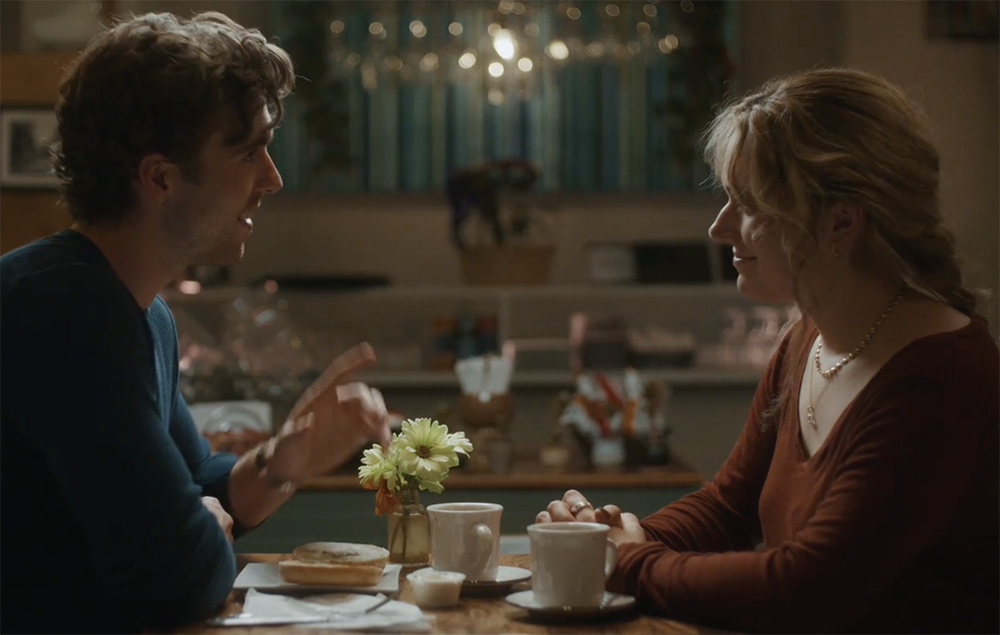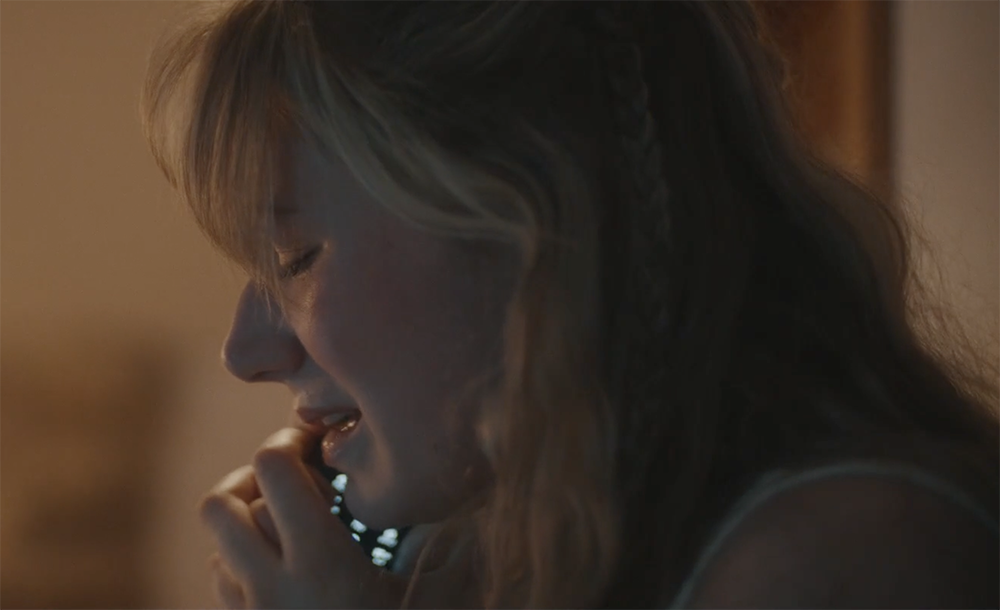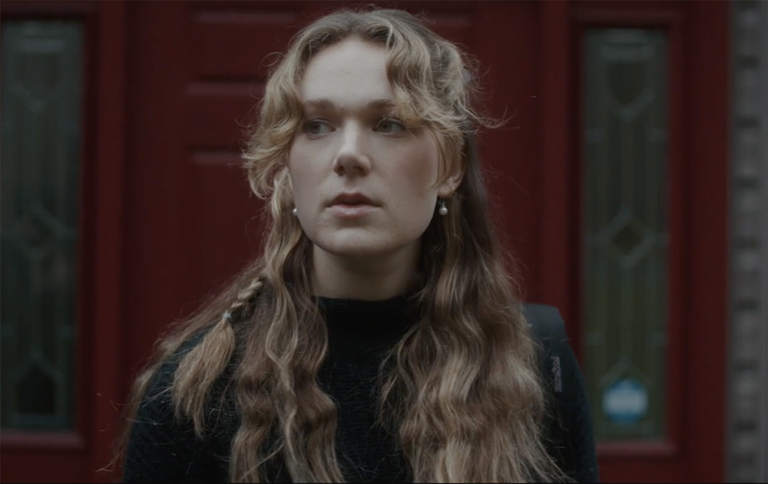“You’re Not There” is an independent film written by Justy Kosek and directed by S.J. Creazzo. It deals with trauma, demons, and how people handle them. It is written for the smaller moments in life—which after all are the biggest. It’s a relationship story, kind of, but intends more to be a healing journey. We meet the film’s protagonists—Baxter and Maggie—at grad school as the film walks them into a meet-cute that turns into a first date. But unlike strict relationship dramas or even indie introspections like Creazzo’s prior film, “Skipping Stones,” the film has more in mind. It navigates the minds and conversations of its leads as they wish for more for themselves. However, its ambiguous and terse ending may leave people who have invested in the characters with more questions than answers.
Independent films have a way of wading in the waters of reality more than Hollywood pictures, and “You’re Not There” is no exception. It helps that both of its lead actors, Nick Mauldin and Nellie Spackman, are excellent in their portrayals. They’ve both been through something profound. And while the film is early to show us Maggie’s, it’s less quick to show us Baxter’s. He’s name is not Baxter, of course, but Jonathan. It’s one of a number of details that comes out in intimate, first/second date conversations that feel like authentic encounters rather than forced on-screen romance.
Real Characters and Real Emotions
The reason “You’re Not There” feels real is that it feels awkward. Maggie and Baxter are grad students in the pharmaceutical field, and the charming-yet-fumbling way they work out their interactions reminded me of “LIVELove,” another indie I watched years ago that centered on a burgeoning relationship and skeletons in the closet. However, Creazzo’s film wants to be more a healing journey than a relationship drama, and as such peppers the proceedings with details of Maggie and Baxter’s past. Maggie is ultra cautious, looking for signs that Baxter may be a dangerous thing to avoid. And Baxter is meanwhile nervous-calling his friend, (an excellent Bryce Michael Wood), worried that he’ll mess it up or it will end up “like last time.” But the two seem like nice people and we care—and sometimes feel anxious—not by dangers they encounter but their willingness to run from signs of its possibility.
“You’re Not There” relies heavily on flashback sequences that only ever tell a fragment of the picture, or sometimes none at all. We glean something truly tragic has happened to Maggie, and indeed it has. No spoilers will be given, as it’s important to work out for yourself; but needless to say she has a right to be fearful of the world. I felt less connected to why she was fearful of Baxter, and I feel this has to do with the film’s 76 minute run-time, where additional scenes could have smoothed out the rough edges. Maggie has a mom (Jenny Strassburg) who reminds her of the times the world was too scary, and warns her not to go to college in NYC. We feel Maggie’s decision to go—it’s a powerful moment of reclaiming yourself I felt was missing at the end of the film.
Feeling Their Vulnerability and Pain

But “You’re Not There” has these gentle moments that make you feel something, especially in the kind, tepid way Maggie and Baxter feel each other out. There’s conversations of what brought them into their grad program—and what they want to do to make the world better—which feel real. And there’s conversations Maggie has with her therapist (Chase Masterson) about what it’s like to live life afraid and constantly analyze the past that felt authentic. But yet a phone call between Baxter and Winston hit the hardest. Baxter reminded me of me, and I wondered through it all how he had come to his station in life.
It’s in these ways the film draws you in, allowing you to feel its characters’ emotions. During a flashback party scene with Maggie, we feel her terror and anger as she runs away from hanging out with peers due to her traumatic past. Yet in another scene later in the film with Baxter, we see anxiety and nervousness acted to perfection. But in still other scenes, as Winston—the relationship guru for Baxter—opens up about how his own relationship getting closer is making him feel more vulnerable and afraid, the film feels authentic and gritty. These are real emotions we have all felt at one time or another, and they come off as our own.
My only criticism of “You’re Not There” is not its acting nor its characters, but its sort of rushed feeling to get to an ending I felt was missing something. The film means to comment on the personality changes trauma has the unfortunate effect of causing, but doesn’t want to wade in a resolution. Maybe there can be no true resolution or healing from trauma—and maybe that’s the message that “You’re Not There” wants to impart.
A Lack of Resolution Leaves You Wanting More

The film’s title is a reference to not being present in life, or being “somewhere else.” But its lack of resolution left me wondering. Baxter had come to a crossroads, and made a decision. We believe Maggie has too. Yet when Baxter’s explanatory flashback scene came, I wasn’t sure how it fit into his relationship fears. And Maggie’s decision in the third act—not to be hinted at—left me wanting more for her than the closing conversations with her younger self the film provides. Spackman and Mauldin are terrific, and really made me care about their emotions. The lack of closure was to me a bit sad. Maybe somewhere there is a slightly longer script or resolution that would have satisfied this for me. Or maybe the film intends you to wonder. Or maybe you can’t understand unless you’ve been there. All could certainly be true.
But all-in-all, “You’re Not There” is a worthy film. It has all the emotional closeness and introspective life conversations that make us love films like this. Baxter and Maggie’s first kiss feels real—as does their burgeoning relationship—and people with all manner of trauma and inner demons will get something out of this film. The feelings and mysteries it explores—and the kindness with which it treats its characters—is refreshing. And while its closing frame didn’t offer me the resolutive hope I was wishing for, it did make me feel I really knew its two protagonists on an intimate level. That in itself may be the film’s crowing grace.
“You’re Not There” is available to buy on pre-order from Amazon now at the following link. It opens on December 17th on Amazon Prime, Apple TV, Google Play, and most VOD services. You can watch the trailer for the film in the window below.



